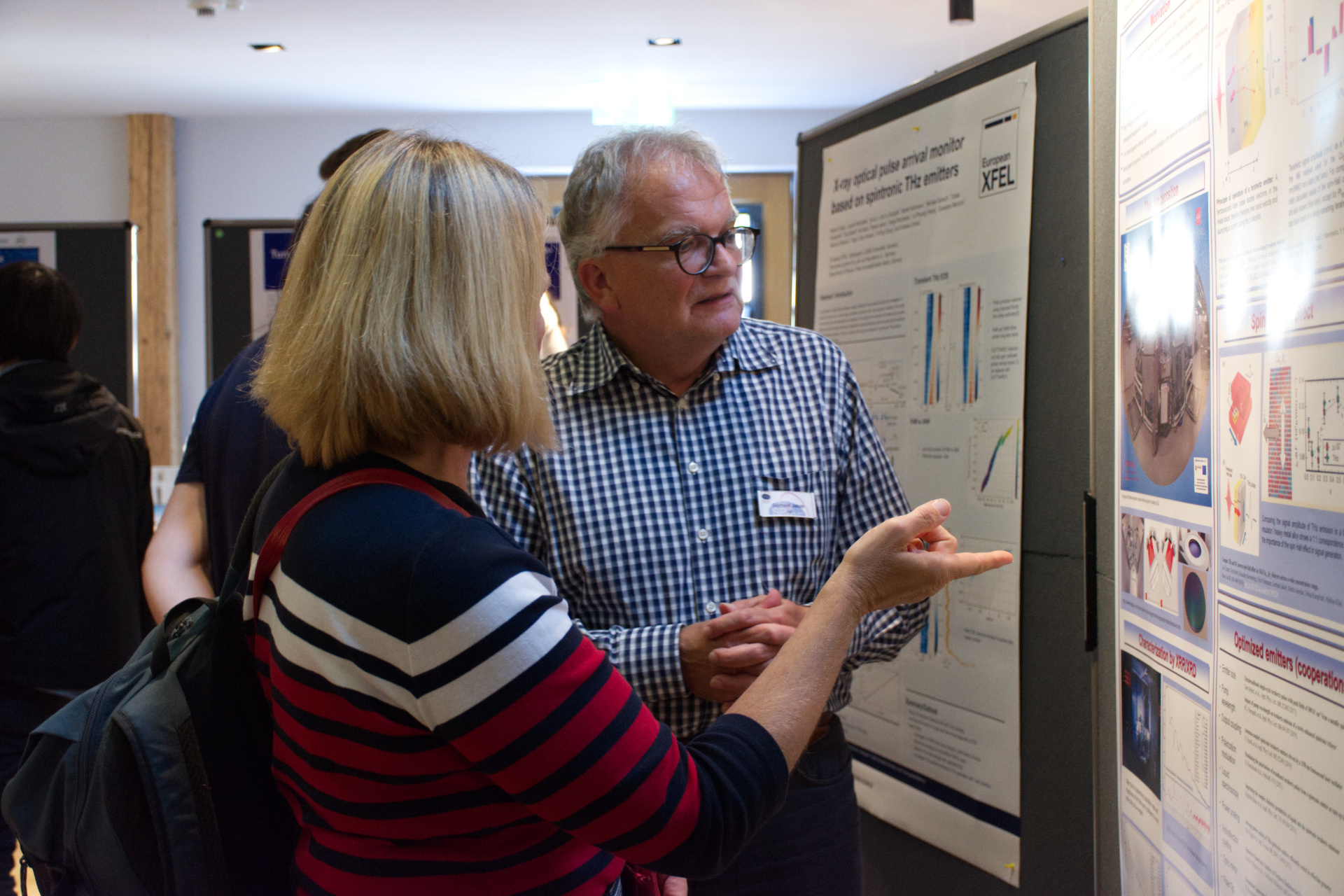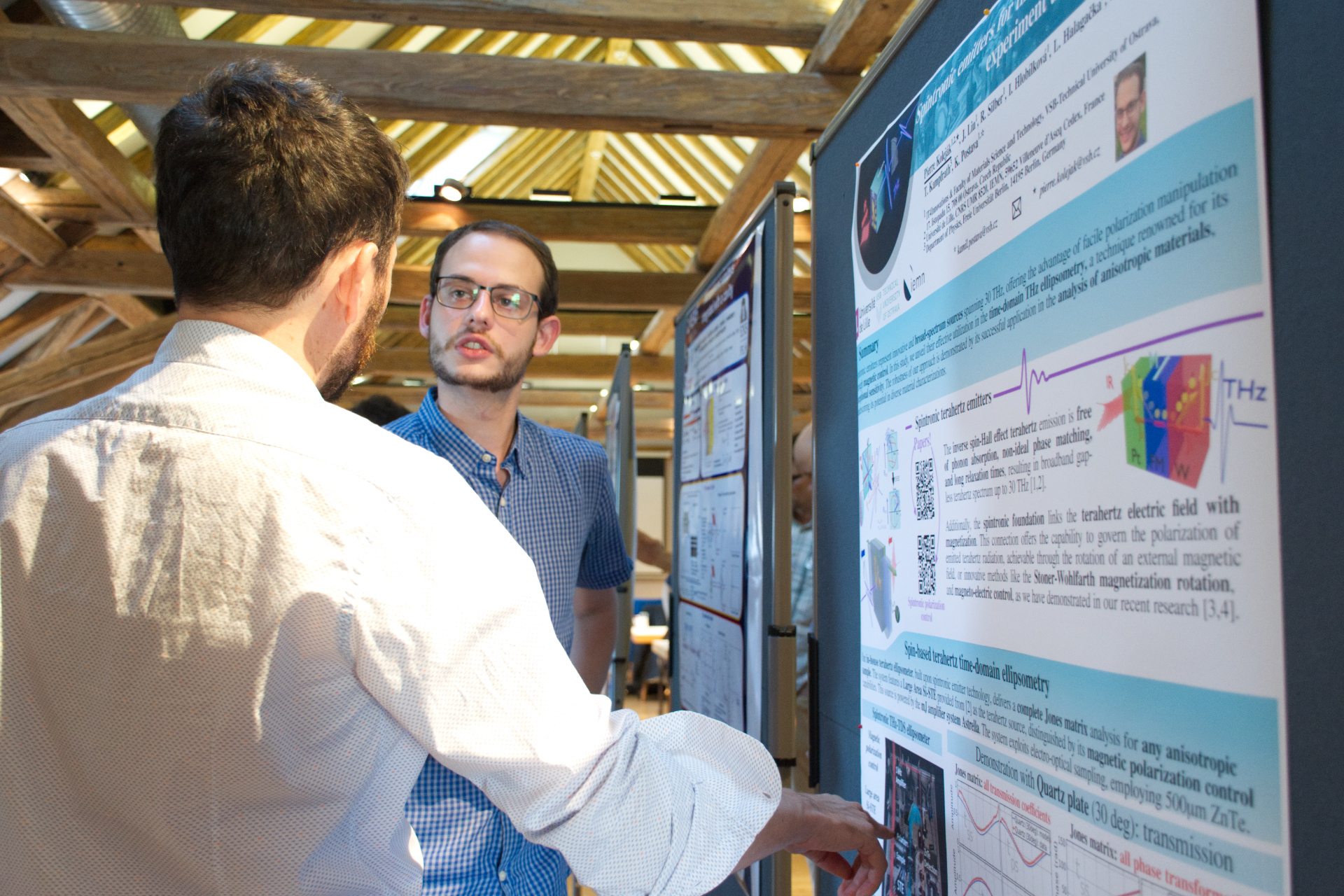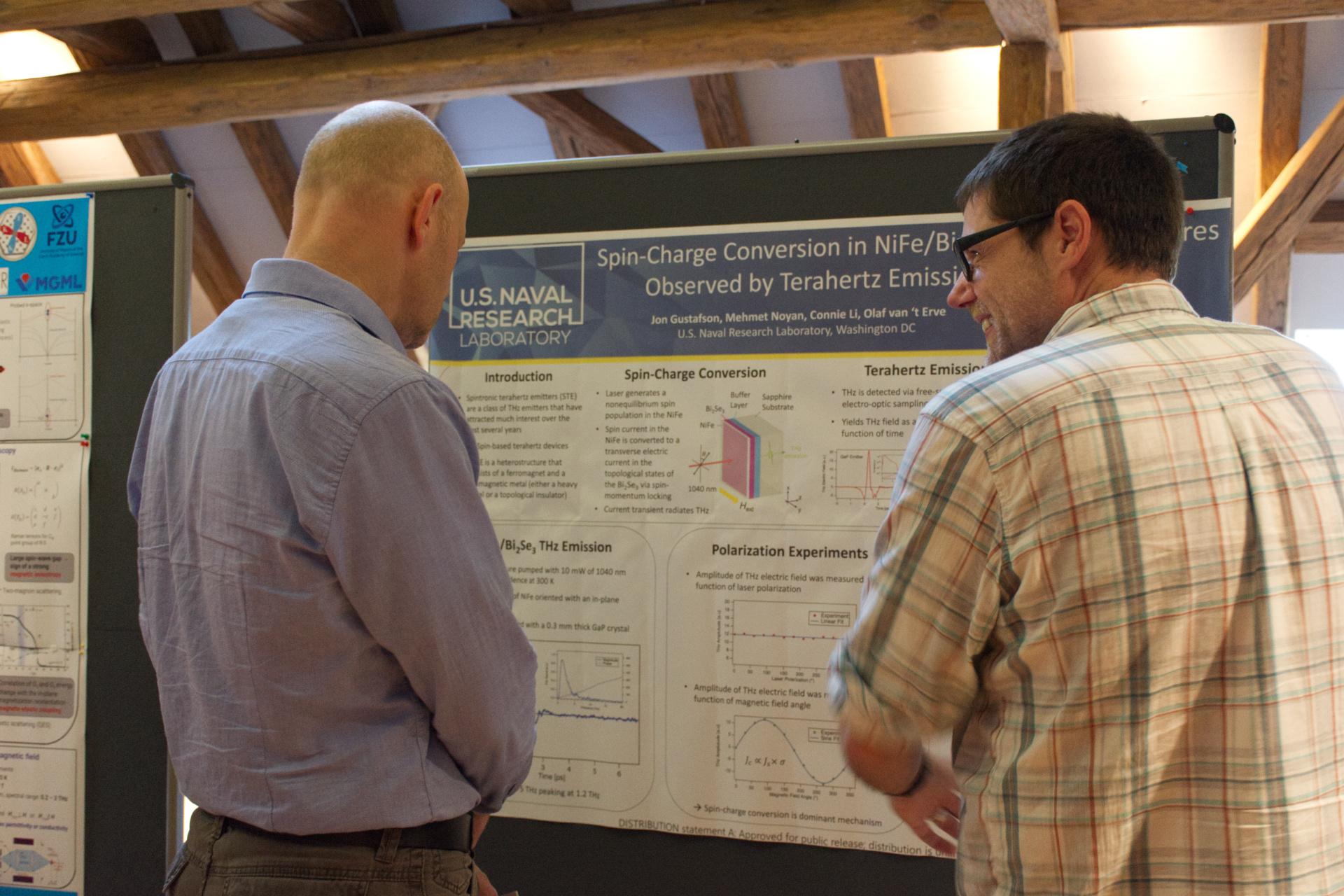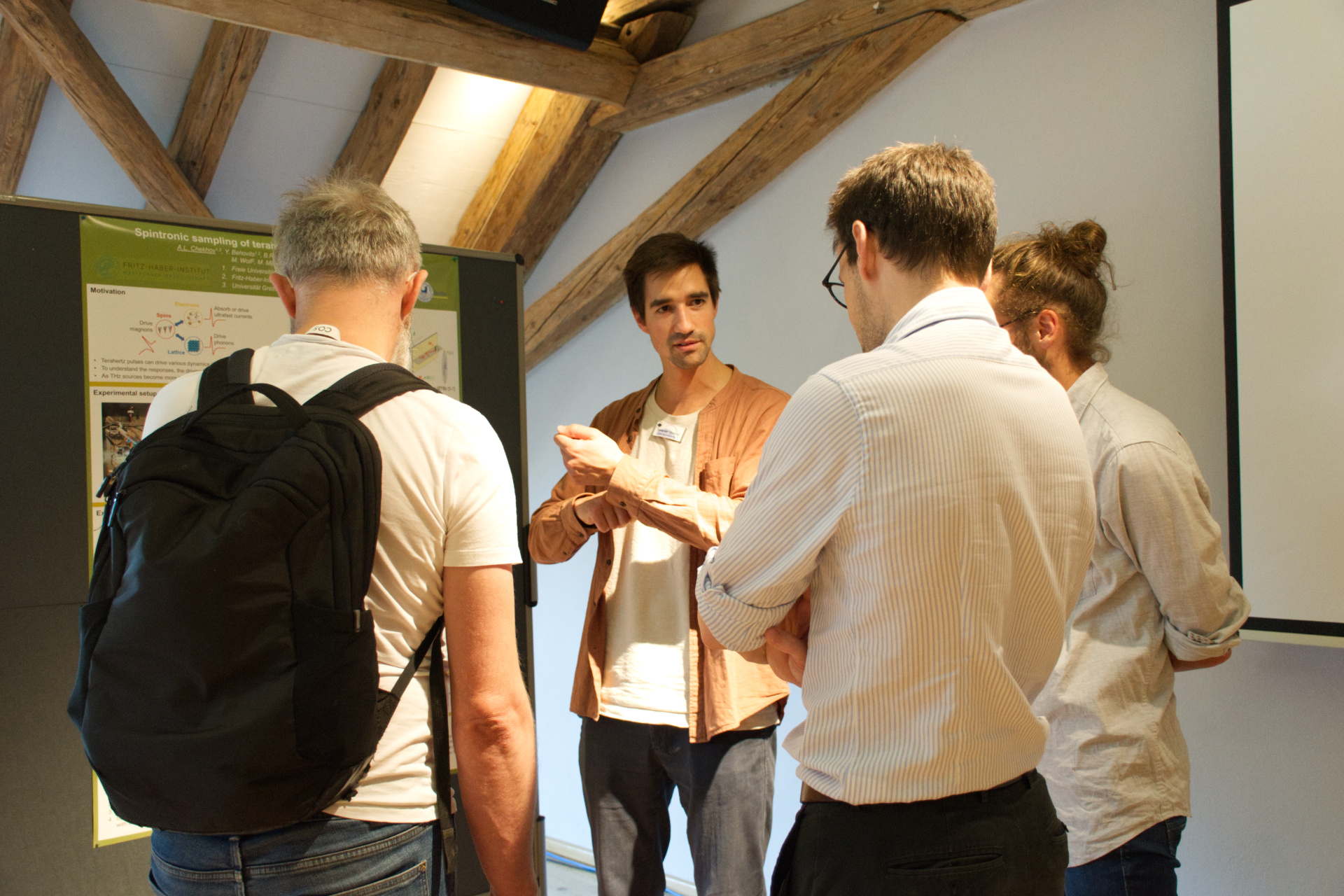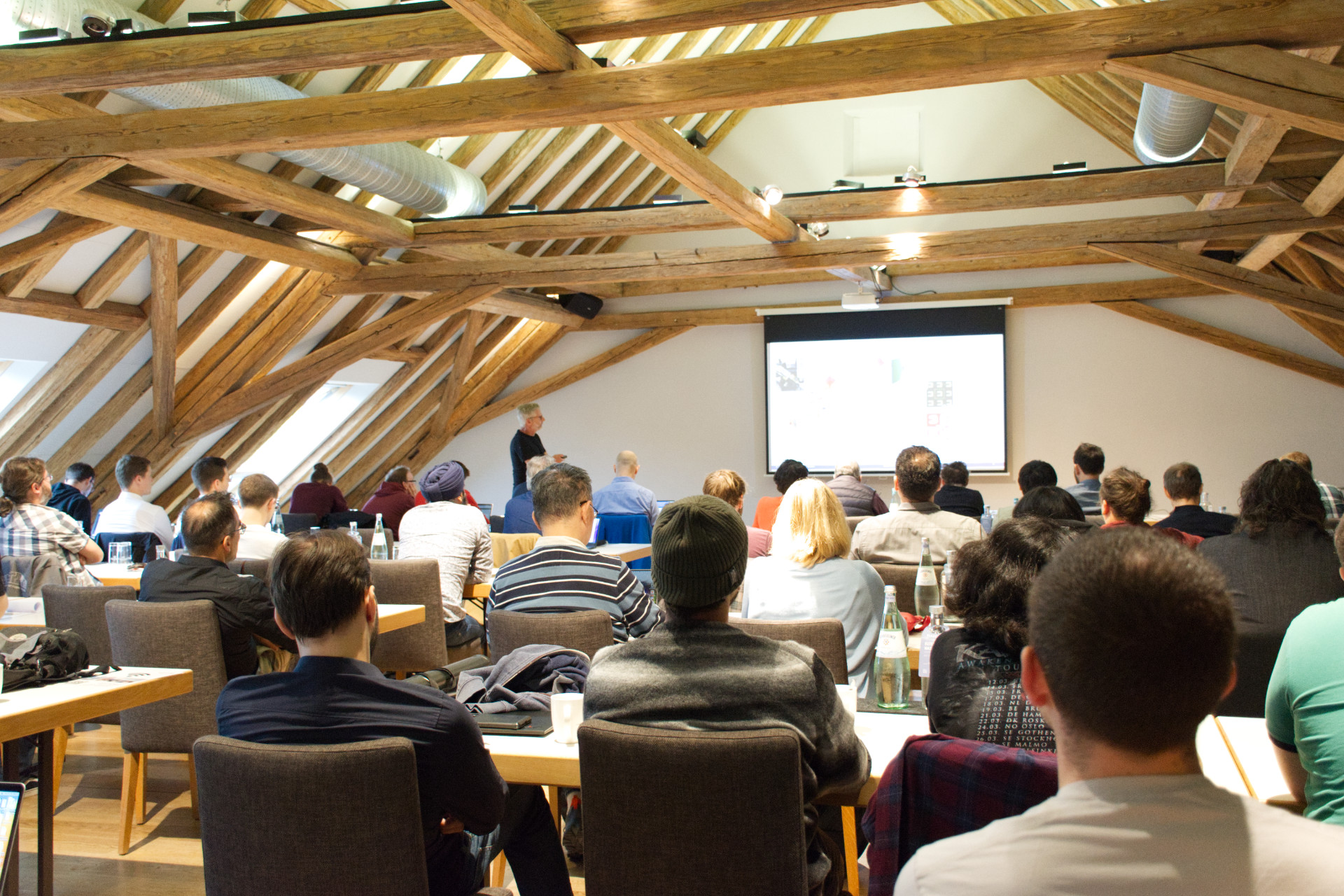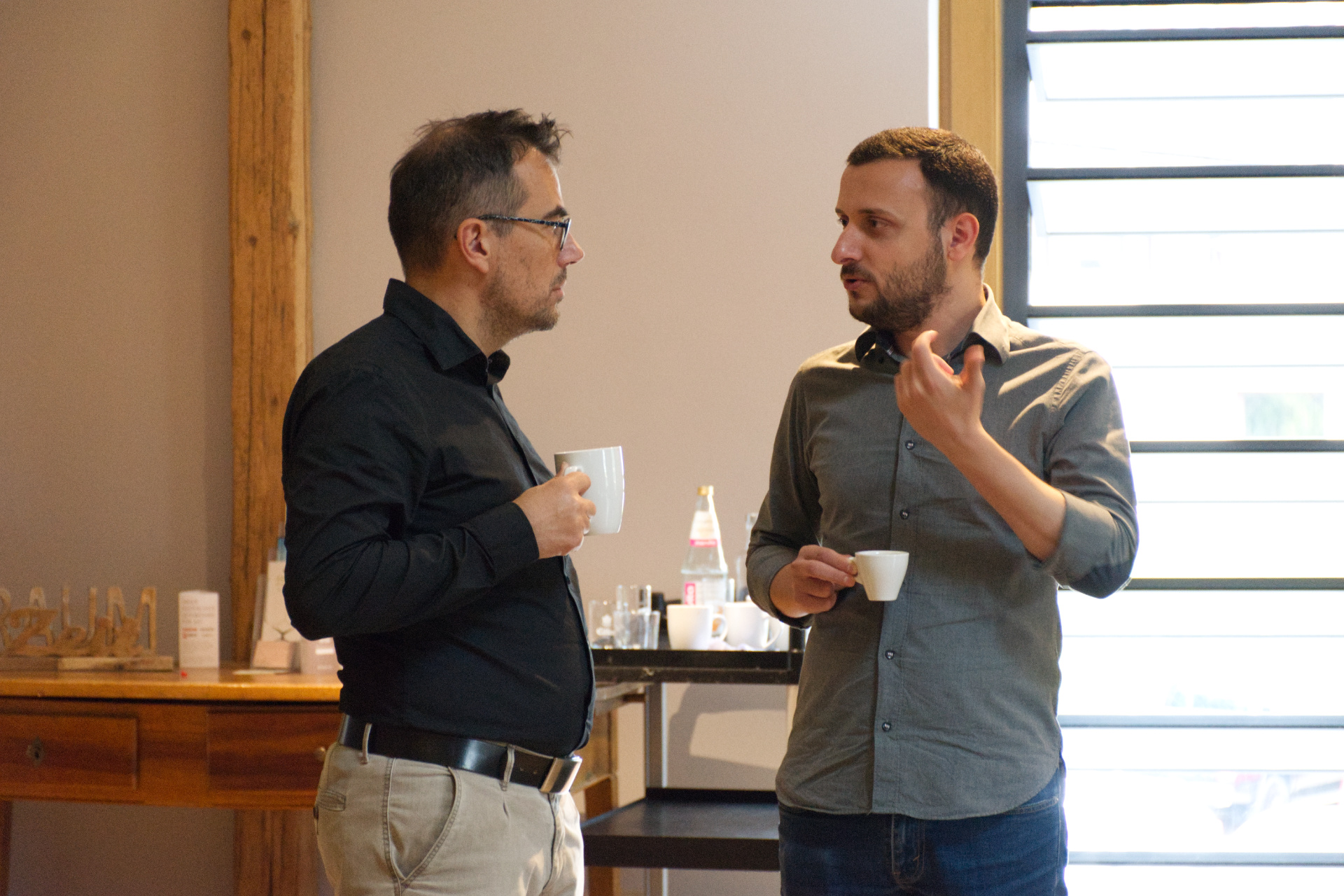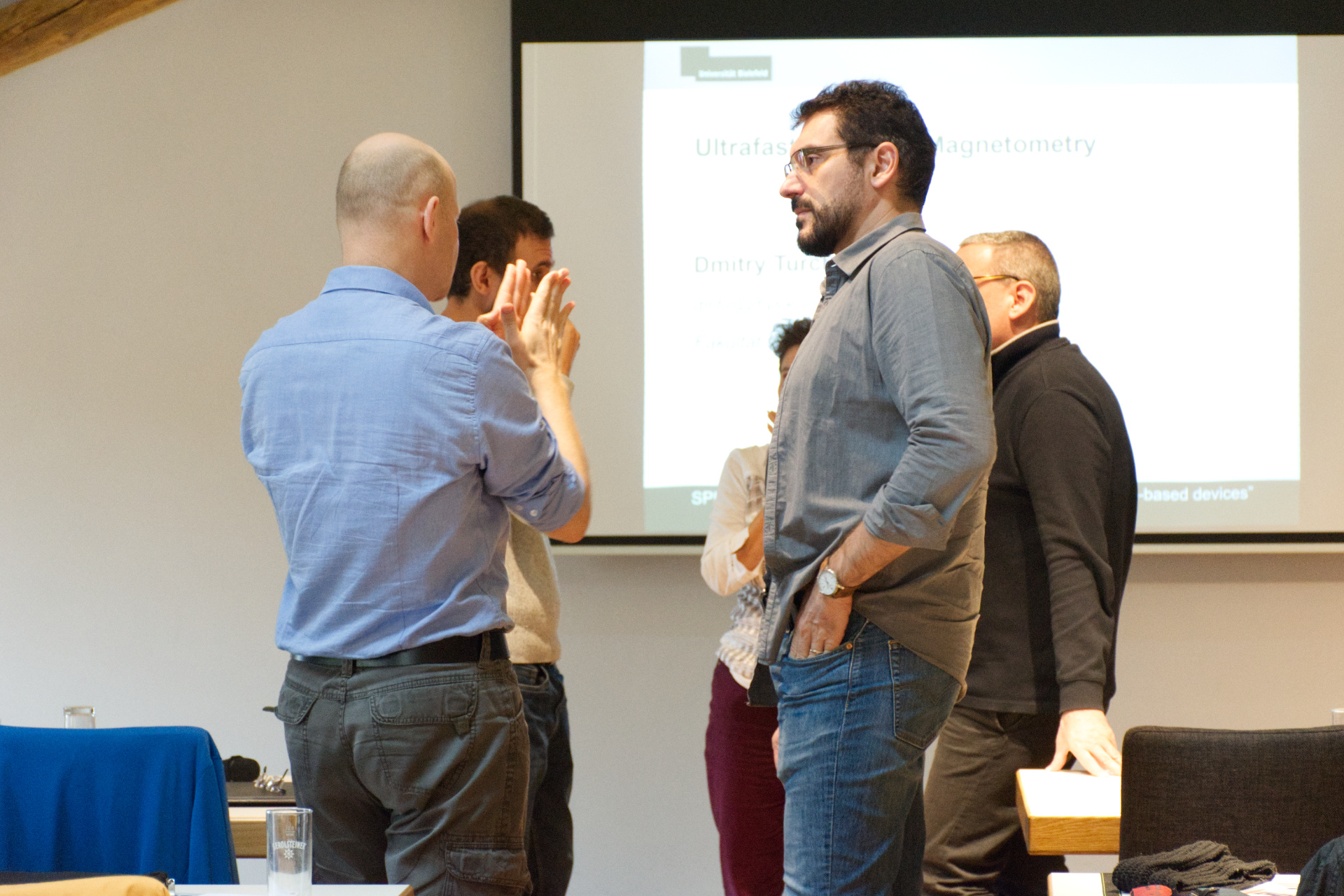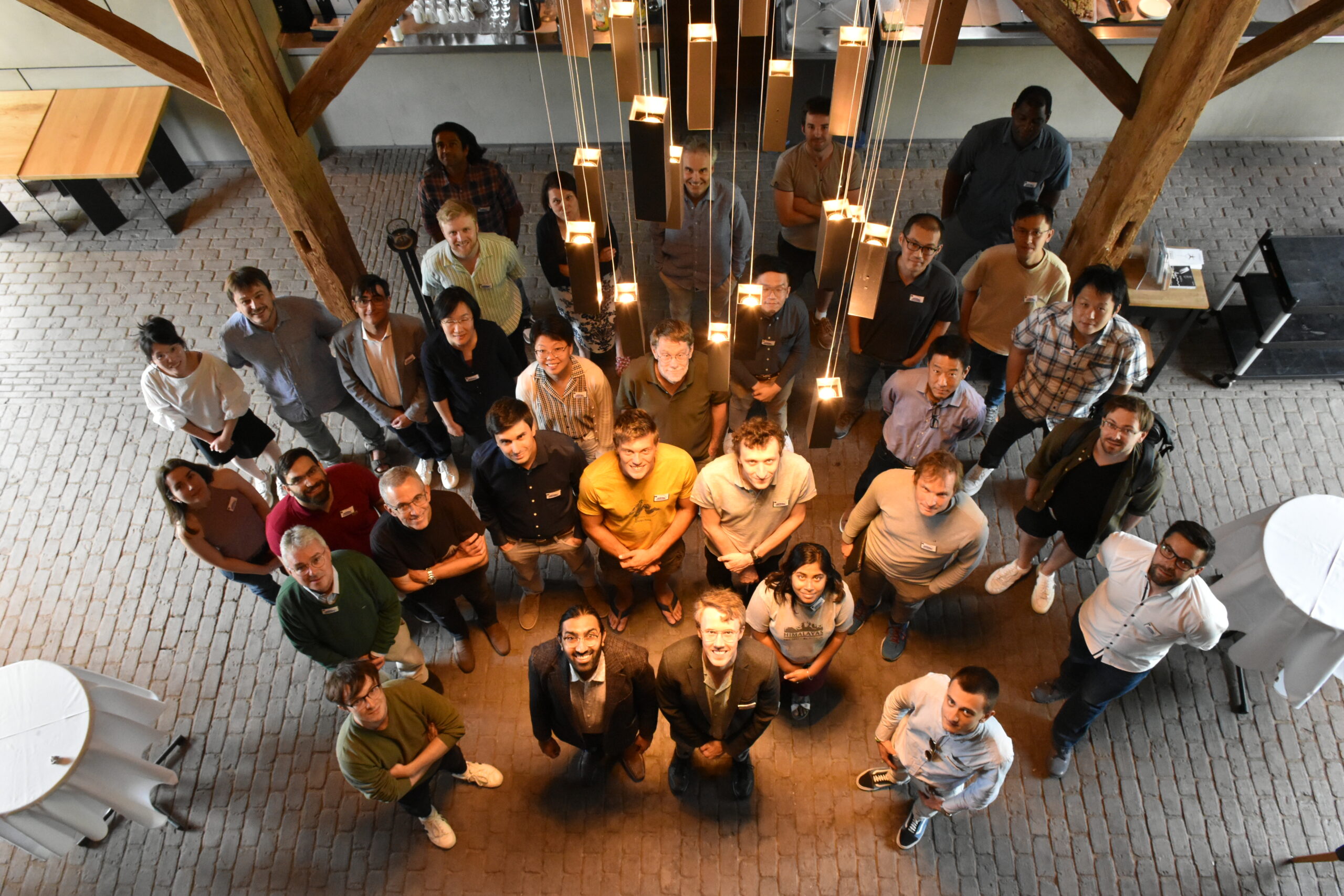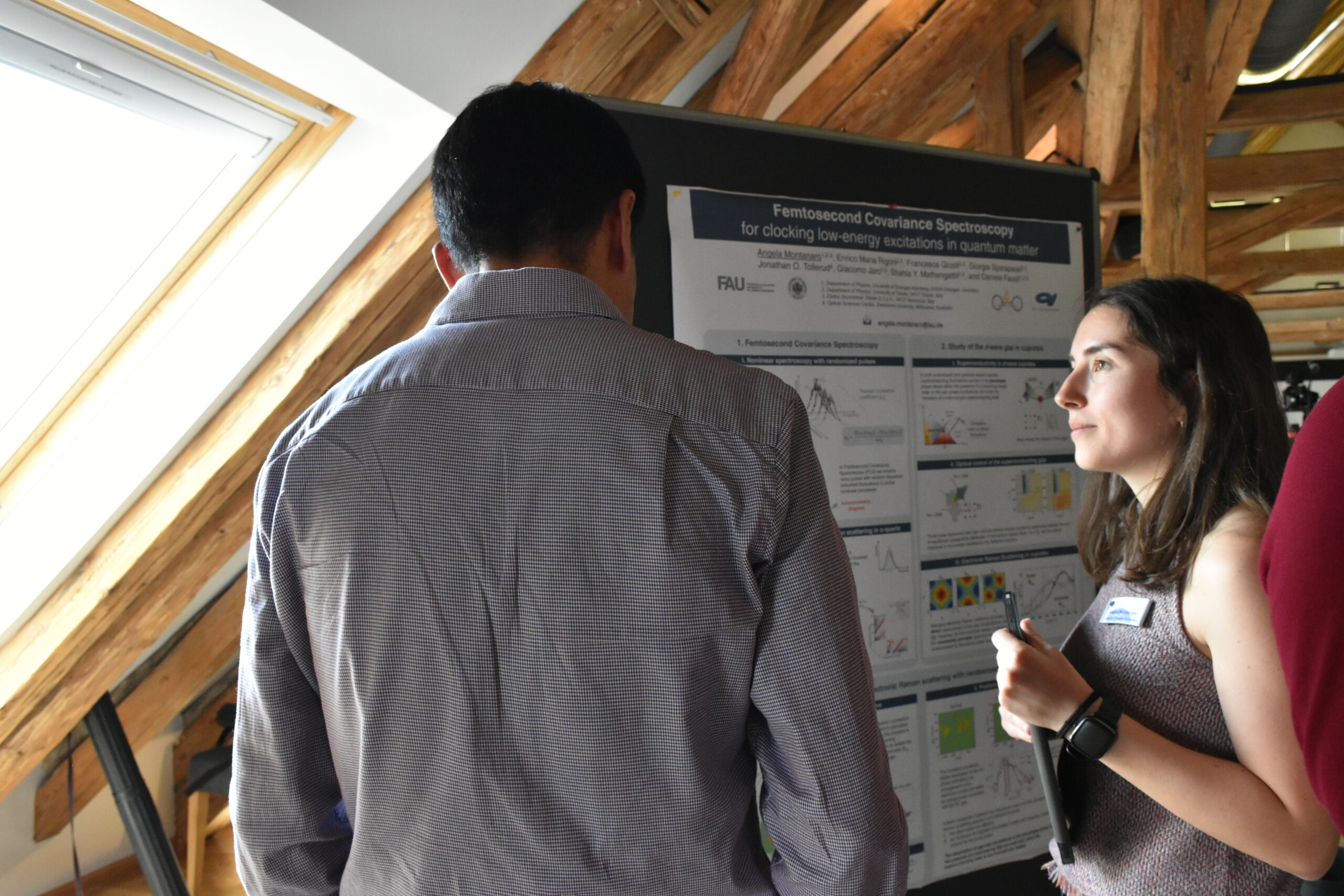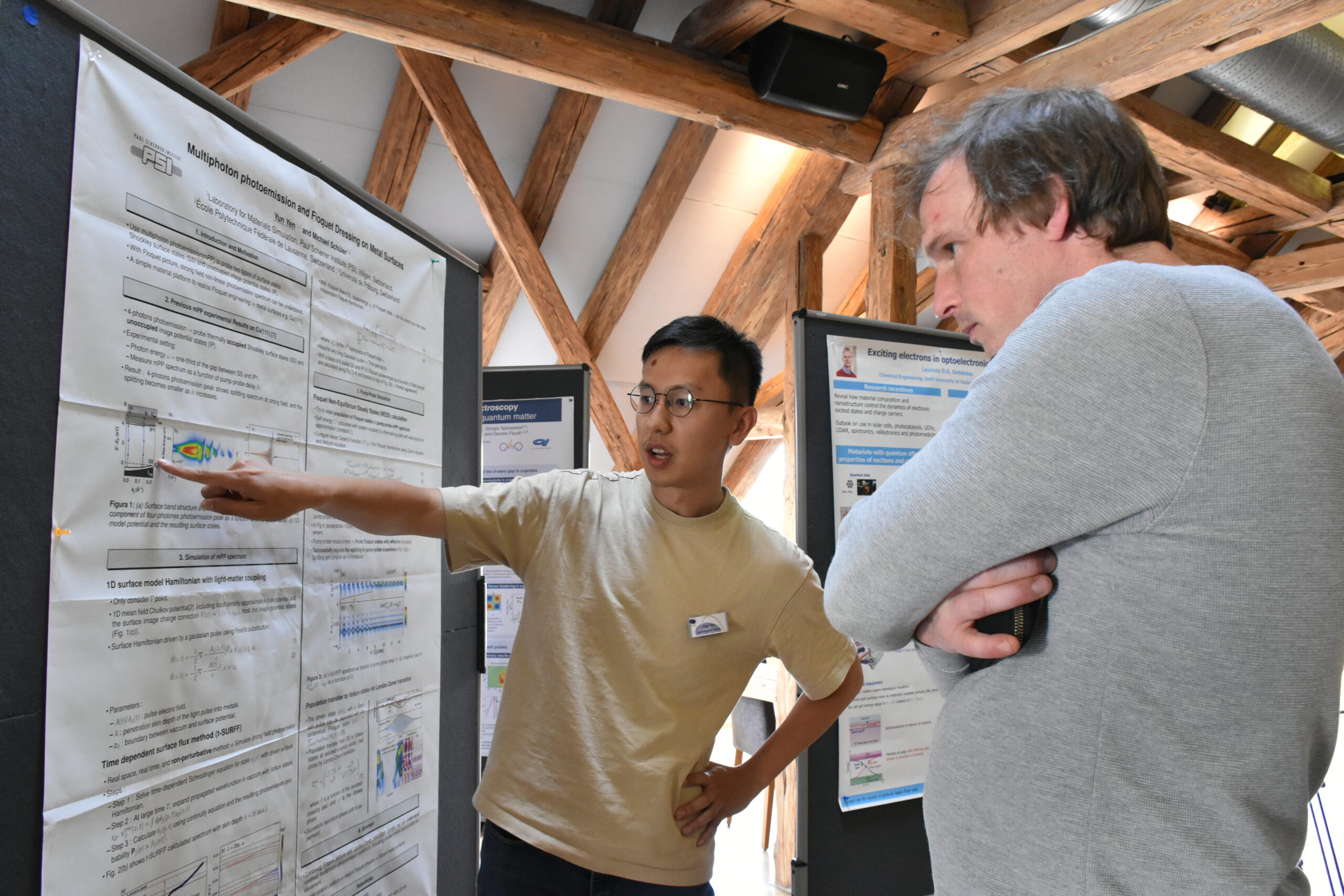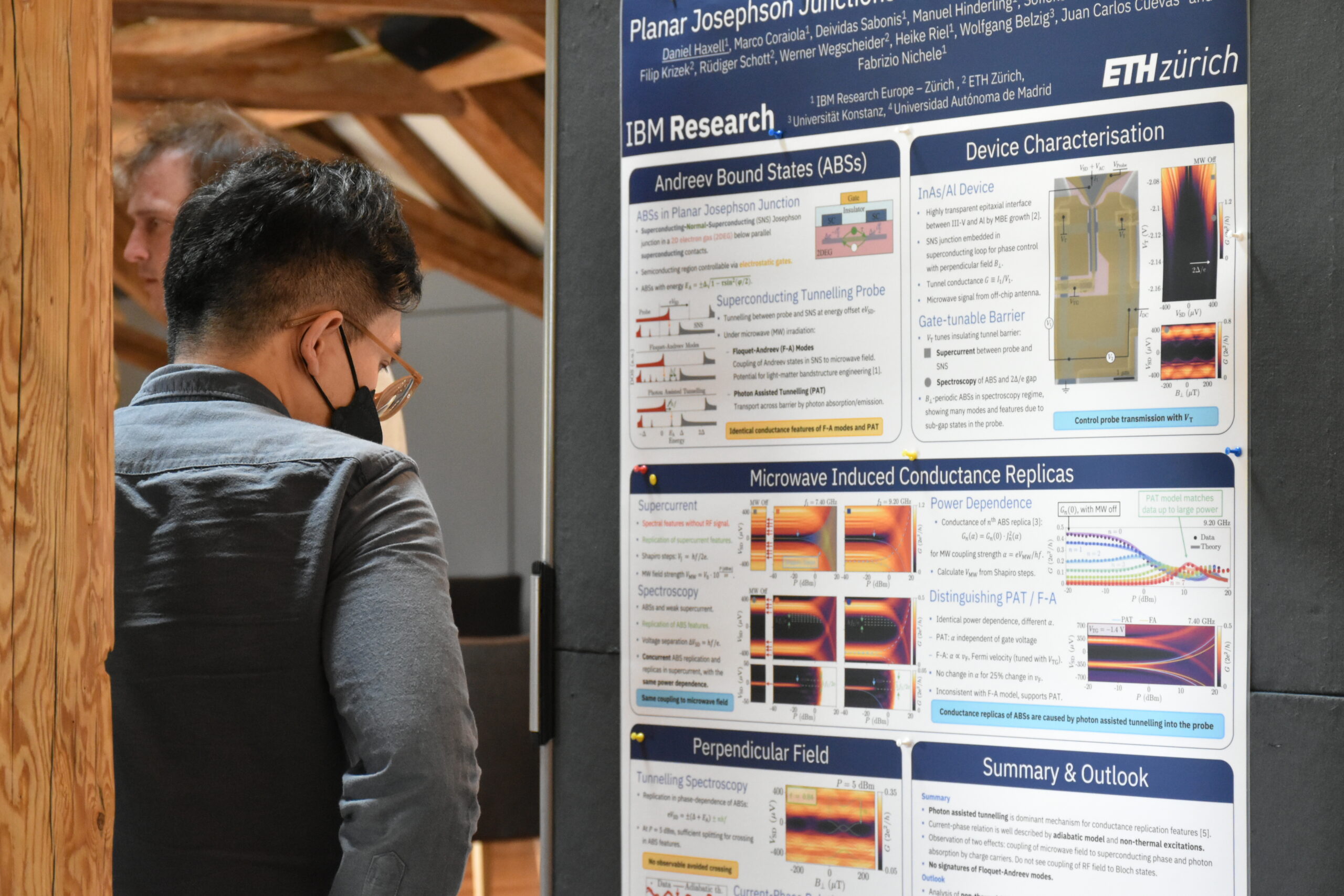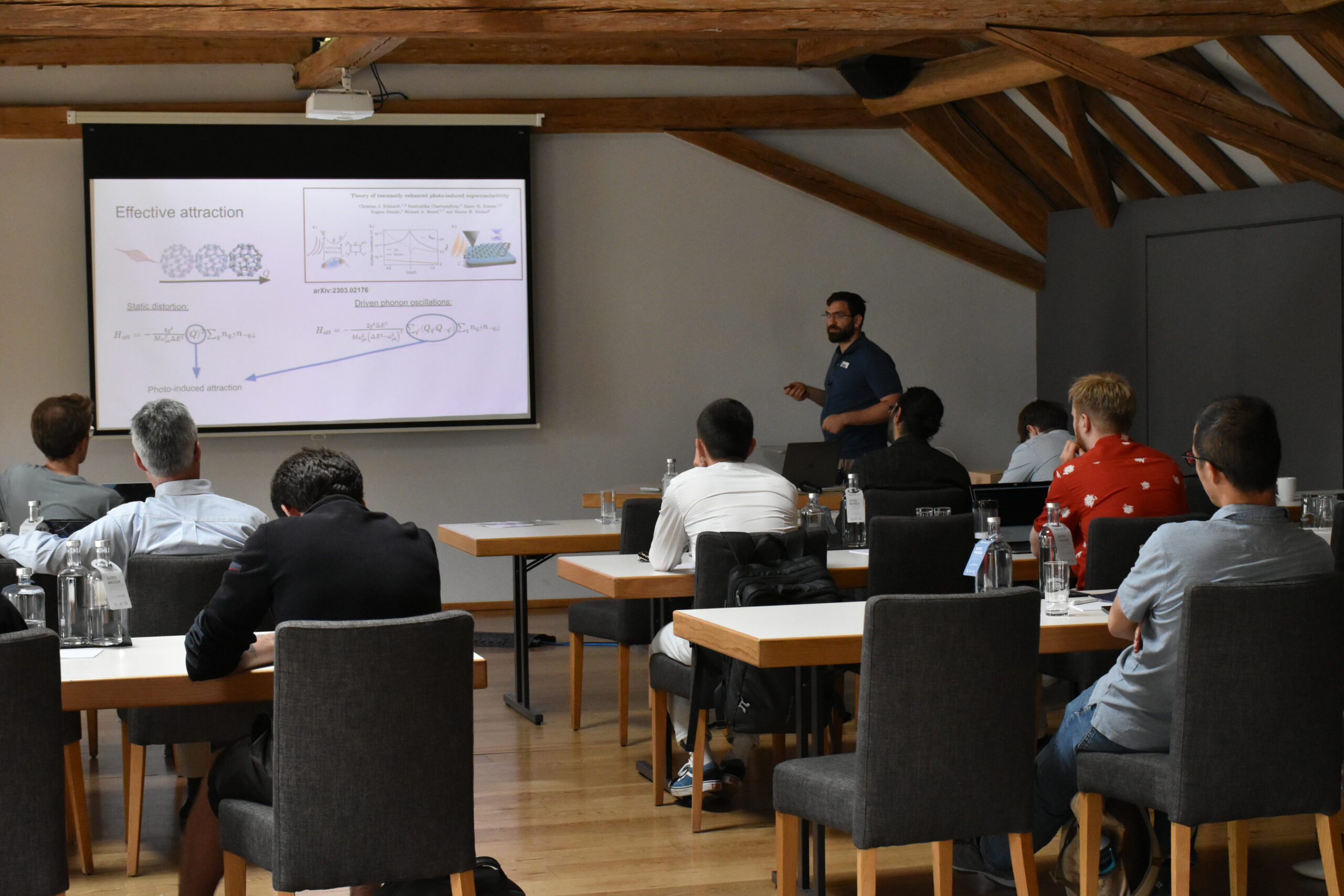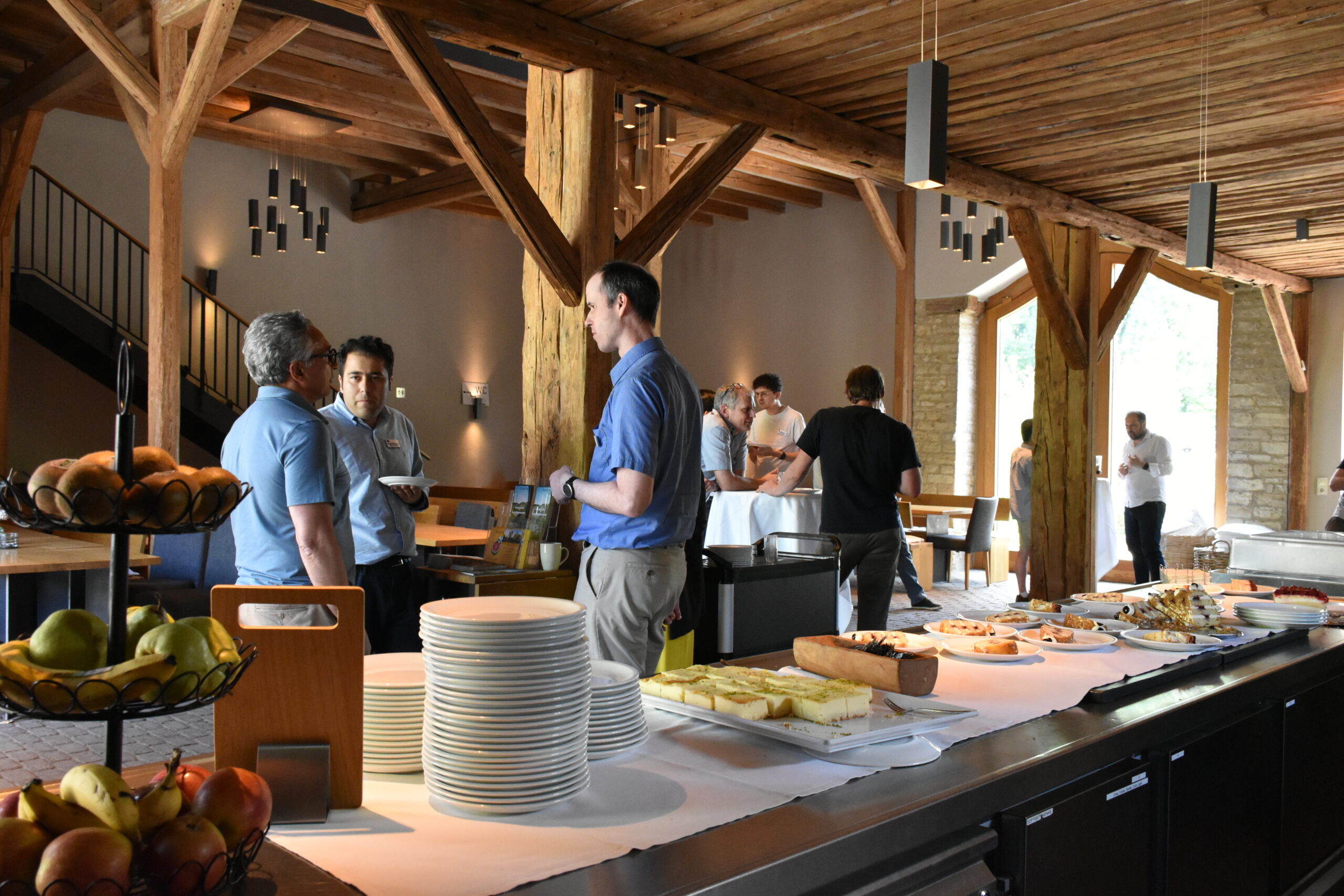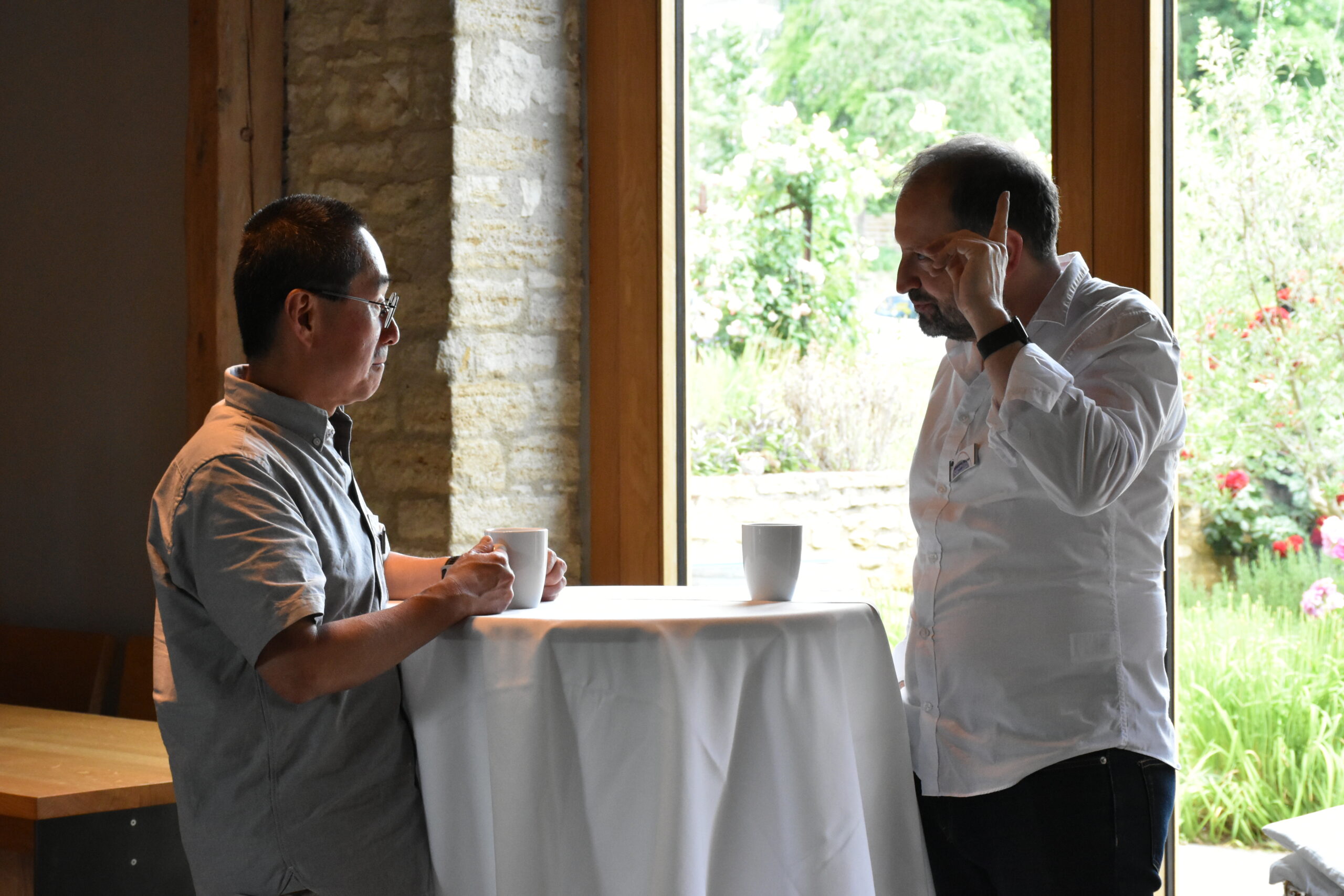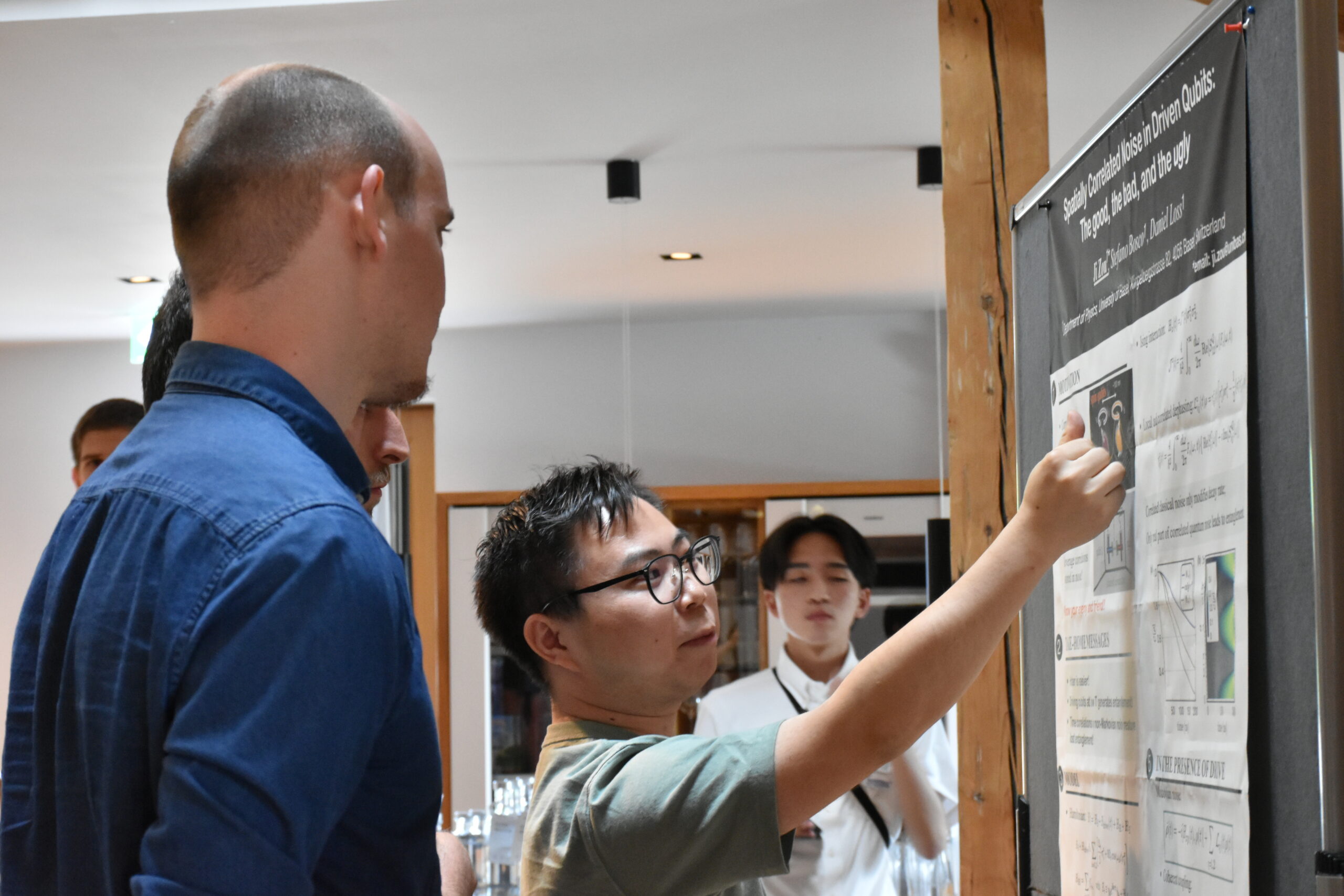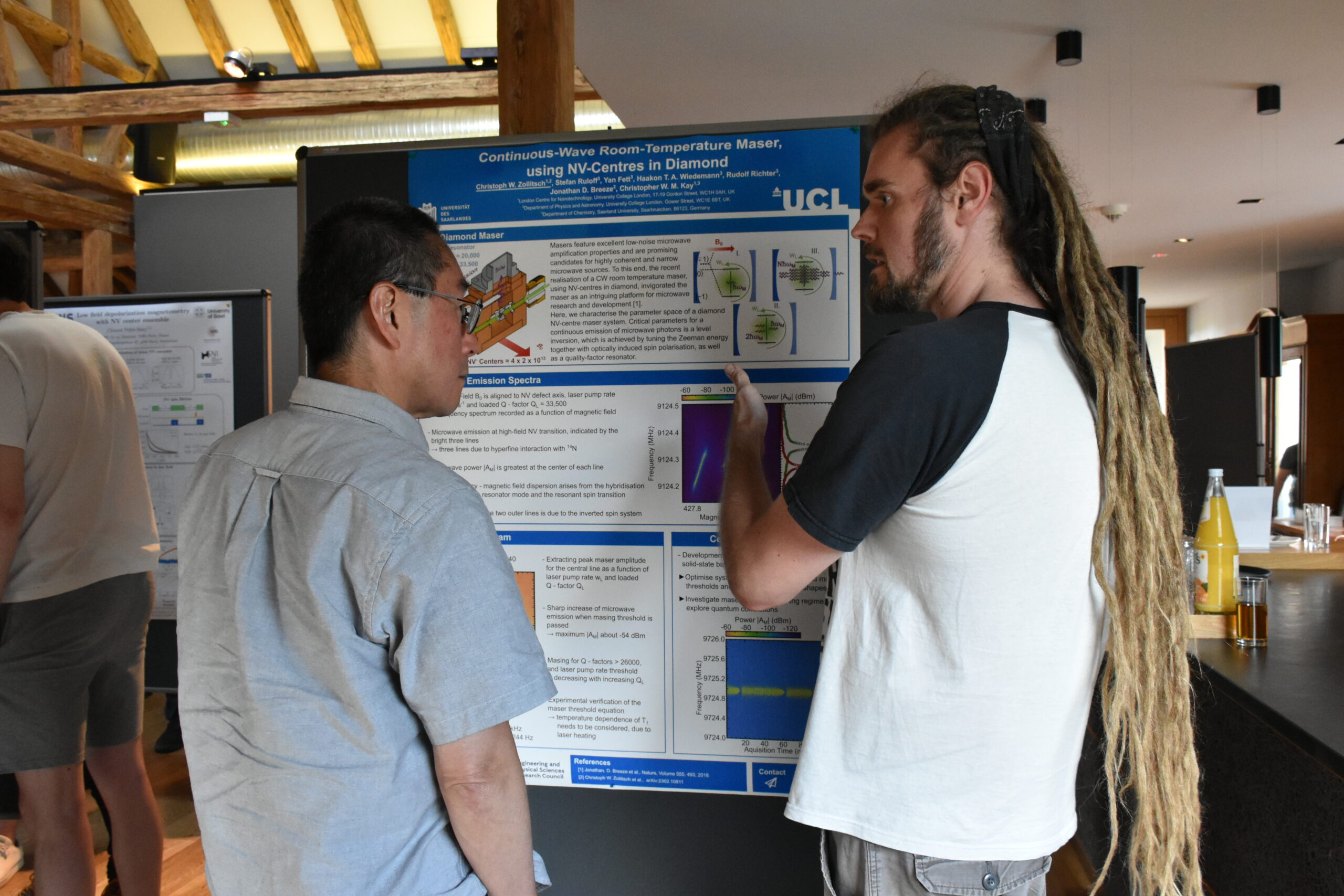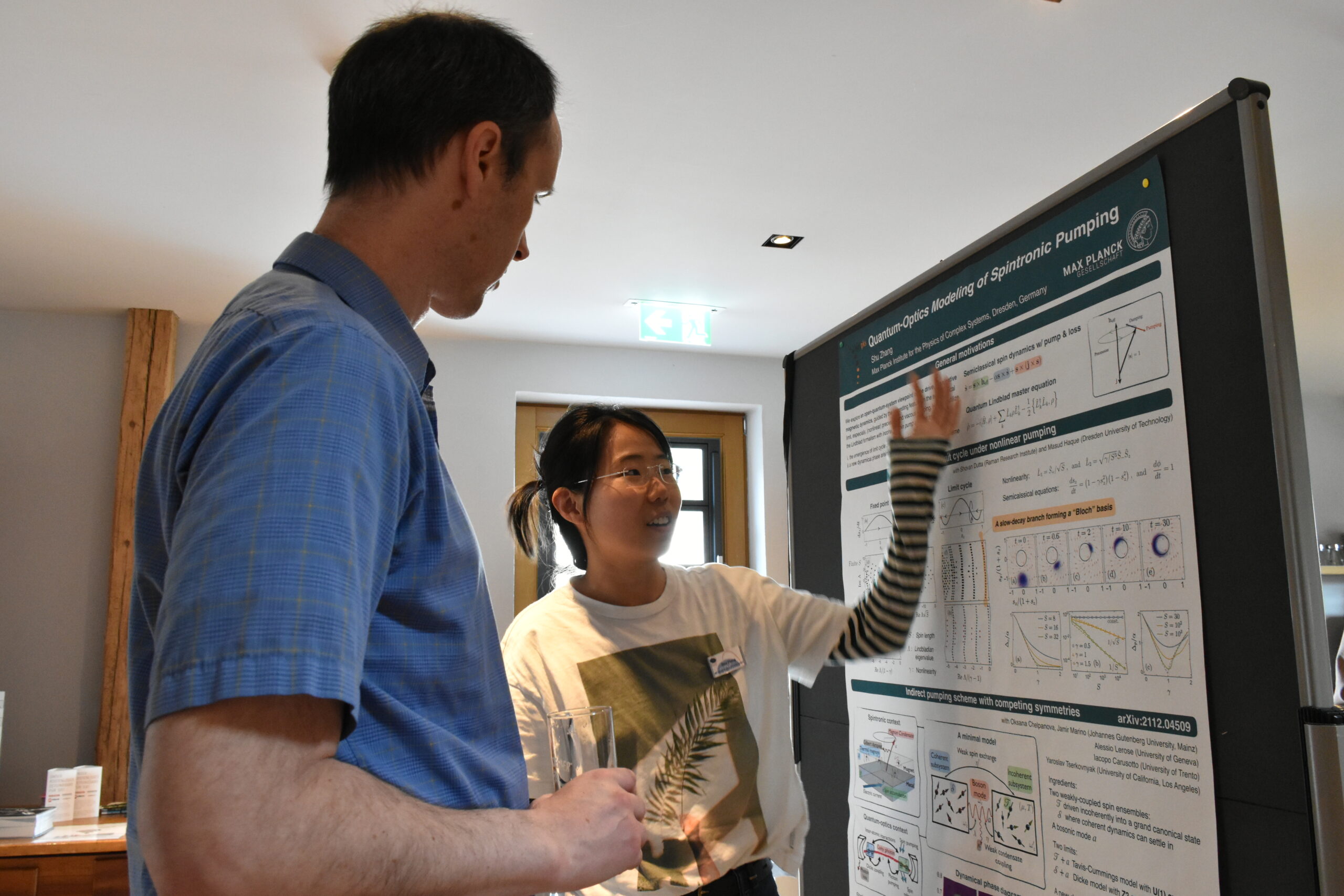Hybrid Correlated States and Dynamics in Quantum Materials
Workshop, May 14th - 16th 2024
- To Image 1
- To Image 2
- To Image 3
- To Image 4
- To Image 5
Correlated states of electrons give rise to quantum matter, such as ordered magnets, spin liquids, superconductors, and topological materials. In lower dimensions, correlations assume a still pronounced importance. The exciting phenomena hosted and technological applications promised by these states of matter have further inspired the scientific community to engineer hybrids where different ingredients for correlations are provided by separate materials coupled together. Thus, such low-dimensional hybrid nanostructures have enabled engineering novel states of matter with intriguing physics, often not admitted by any single platform.
The workshop shall bring together experts and young researchers from three different communities: (i) Magnetism and Spintronics, (ii) Superconductivity and Strongly Correlated Electrons, and (iii) Low-dimensional nanostructures. The purview includes coherent and incoherent magnetization dynamics in conjunction with the various spintronics effects that allow its manipulation and detection. A key topic will be the recently discovered nonreciprocal effects in magnets e.g., chiral magnons, as well as superconductors, e.g., the superconducting diode effect. Recent discoveries regarding two-dimensional materials, multi-orbital superconductivity, Ising superconductors, topological superconductivity and quantum sensors coupled to magnets will also be central to the workshop portfolio. Employing fluctuations of currents (e.g, flow of spin or vortices) to probe the quantum nature of transport will form an exciting topic of discussion across communities. Finally, the case of spin fluctuations mediated superconductivity, that is believed to underlie a wide range of unconventional superconductors can best be discussed with the three communities present at the workshop.
This workshop is organized by SPICE as part of the Gutenberg International Conference Center (GICC) at Johannes Gutenberg University Mainz (JGU). The GICC is funded through the German Research Foundation’s (DFG) university allowance in the Excellence Strategy program and aims at fostering JGU as a national and international research hub. By organizing regular conferences and workshops in fields of excellent JGU research, the GICC provides a platform to build interest networks and collaborations – to promote exchange and dialog among academics and research groups from all over the world.
Organizers
Sebastian T. B. Goennenwein, University of Konstanz
Tero T. Heikkilä, University of Jyväskylä
Lina Johnsen Kamra, MIT
Akashdeep Kamra, Autonomous University of Madrid
Invited Speakers
Matthias Althammer, Walther Meissner Institute
Gerrit Bauer, UCAS
Wolfgang Belzig, University of Konstanz
Sebastian Bergeret, Materials Physics Center
Andrei Bernevig, Princeton
Annica Black-Schaffer, Uppsala University
Shubhayu Chatterjee, Carnegie Mellon University
Katharina Franke, Free University of Berlin
Olena Gomonay, JGU
Yasen Hou, MIT
Hans Huebl, Walther Meissner Institute |
Lina Johnsen Kamra, MIT
Shawulienu Kezilebieke, University of Jyväskylä
Jelena Klinovaja, University of Basel
Vinod Menon, City University of New York
Christina Psaroudaki, ENS
Helena Reichlova, Institute of Physics ASCR
Jason Robinson, Cambridge University
Christoph Strunk, University of Regensburg
Päivi Törmä, Aalto University
Xiaodong Xu, University of Washington |
Altermagnetism: Emerging Opportunities in a New Magnetic Phase
Workshop, May 9th - 11th 2023
- To Image 1
- To Image 2
- To Image 3
- To Image 4
- To Image 5
This workshop focuses on the emerging magnetic material class of altermagnets. This recently discovered magnetic phase is separate from the ferromagnetic and antiferromagnetic phases that we are used to. The new altermagnetic class shows compensated magnetic ordering and alternating spin-polarization in both the direct and momentum space, with a d-wave (or higher even-parity wave) symmetry. Altermagnets span a large range of materials from insulators to superconductors, and exhibit properties characteristic of ferromagnetism, antiferromagnetism, and other unique properties that neither of the two previously known classes have.
The novel properties of altermagnets have links to many fields of research, such as spintronics, ultra-fast photo-magnetism, neuromorphics, multiferroics, magnonics, topological matter, or superconductivity. The workshop brings together junior and senior scientists from diverse research fields to explore this fascinating newly discovered magnetic phase.
This workshop is organized by SPICE as part of the Gutenberg International Conference Center (GICC) at Johannes Gutenberg University Mainz (JGU). The GICC is funded through the German Research Foundation’s (DFG) university allowance in the Excellence Strategy program and aims at fostering JGU as a national and international research hub. By organizing regular conferences and workshops in fields of excellent JGU research, the GICC provides a platform to build interest networks and collaborations – to promote exchange and dialog among academics and research groups from all over the world.
Organizers
Helen Gomonay, JGU
Tomas Jungwirth, Czech Academy of Sciences
Aleksei V. Kimel, Radboud Univ.
Jairo Sinova, JGU
Libor Šmejkal, JGU
Invited Speakers
Sayantika Bhowal, ETH Zurich
Stefan Blügel, Julich Zentrum
Arnab Bose, JGU/Cornell Univ.
Davide Bossini, Univ. of Konstanz
Sang-Wook Cheong, The Rutgers Univ.
Hans-Joachim Elmers, JGU
Edgar Felipe Galindez Ruales, JGU
Nirmal Ghimire, George Mason Univ.
Sebastian Goennenwein, Univ. of Konstanz
Shutaro Karube, Kyoto Univ.
Aleksei V. Kimel, Radboud Univ.
Dominik Kriegner, Czech Academy of Sciences |
Qihang Liu, SUSTech
Andrew P. Mackenzie, MPI Dresden
Igor Mazin, George Mason Univ.
Paul McClarty, MPI Dresden
Johan Mentink, Radboud Univ.
Yuriy Mokrousov, Julich Zentrum
Helena Reichlova, Czech Academy of Sciences
Libor Šmejkal, JGU
Cheng Song, Tsinghua
Peter Wadley, Univ. of Nottingham |
Terahertz Spintronics: toward Terahertz Spin-based Devices
Workshop, October 10th - 12th 2023
- To Image 1
- To Image 2
- To Image 3
- To Image 4
- To Image 5
- To Image 6
- To Image 7
- To Image 8
THz spintronics is a novel research field that combines magnetism and spintronic with ultrafast optics. Although ultrafast demagnetization of ferromagnetic materials at picosecond timescale has been first observed already three decades ago, recent years have seen the rapid development of THz spintronic devices stemming from ground breaking studies. Many studies pushed the GHz limits of standard spintronic devices to the THz range by investigating new materials and spin-orbit interactions at ultrafast time scale. Especially, the development of broadband and high power spintronic THz emitters based on simple nanometer thin ferromagnetic / heavy metal bilayers holds the prospect to extend the THz field and widen its applications that has long while been limited to niches for astronomers and spectroscopists.
In the last years, the numerous improvements made in material research (such as on topological insulators and antiferromagnetic materials), interface quality and device engineering have been central to both explore spin-based physics at THz frequencies and investigate to new concepts of spin based THz devices. These cover the full THz block chain (broad and narrowband THz generation and detection, together with control of radiation properties such as polarization and ellipticity) as well as new approaches for THz imaging and encoding THz information. The widespread interest and progress in spin-based THz physics and devices continues to accelerate requiring joint efforts from magnetism, optics and engineering research communities. This workshop will bring together world-leading scientists from these broad range of communities, generating further collaborations and developmentsin this emerging field.
This workshop is organized by SPICE as part of the Gutenberg International Conference Center (GICC) at Johannes Gutenberg University Mainz (JGU). The GICC is funded through the German Research Foundation’s (DFG) university allowance in the Excellence Strategy program and aims at fostering JGU as a national and international research hub. By organizing regular conferences and workshops in fields of excellent JGU research, the GICC provides a platform to build interest networks and collaborations – to promote exchange and dialog among academics and research groups from all over the world.
Organizers
Sukhdeep Dhillon, Ecole Normale Supérieure
Tobias Kampfrath, FU and FHI Berlin
Romain Lebrun, Unité mixte de Physique CNRS/Thales
Invited Speakers
Theodoros Adamantopoulos, FZJ
Joe Barker, Leeds University
Marco Battiato, NTU Singapore
Yannic Behovits, FU Berlin
Stefano Bonetti, Venice University
Elbert Chia, Nanyang Technological University
Shunsuke Fukami, Tohoku University
Jon Gorchon, Lorraine University
Darren Graham, University of Manchester
Henri Jaffres, CNRS/Thales
Benjamin Jungfleisch, University Delaware
Tomas Jungwirth, Czech Academy of Sciences
Alexei Kimel, Radboud University |
Melanie Müller, FHI
Markus Münzenberg, Greifswald University
Peter Oppeneer, Uppsala University
Evangelos Th. Papaioannou, Martin-Luther University/ Aristotle University
Felix Paries, Fraunhofer Institute for Industrial Mathematics ITWM
Enzo Rongione, ICN2
Tom Seifert, FU Berlin
Ranjan Singh, Nanyang Technological University
Dmitry Turchinovich, Bielefeld University
Mathias Vanwolleghem, Lille University
Xiaojun Wu, Beihang University |
Non-equilibrium Quantum Materials Design
Workshop, June 27th - 29th 2023
- To Image 1
- To Image 2
- To Image 3
- To Image 4
- To Image 5
- To Image 6
- To Image 7
Quantum materials driven out of equilibrium by strong electric fields exhibit phenomena that challenge our physical understanding of solids and could be implemented in future device technologies. Examples include photo- and current-induced transitions to metastable hidden phases, the ultrafast optical manipulation of ferroelectricity and magnetism, light-induced superconductivity, and the creation of photon-dressed topological states. While much progress has been made in characterizing these effects, turning them into real-world functionalities requires stabilizing them at high temperature, on long time scales, and with minimal input power. These challenges are inherently of a materials nature. The focus of this workshop is to bring together experts in quantum materials synthesis (single crystals, thin films, vdW heterostructures) with experimentalists and theorists investigating non-equilibrium phenomena to spark a new generation of non-equilibrium quantum materials design – that is, to create quantum materials that are specifically designed for their out-of-equilibrium response to optical and electrical perturbations. The long-term goal is to create a feedback loop between materials synthesis, experimental characterization and theory for non-equilibrium physics, similar to the successful strategies employed in equilibrium quantum materials design.
This workshop is organized by SPICE as part of the Gutenberg International Conference Center (GICC) at Johannes Gutenberg University Mainz (JGU). The GICC is funded through the German Research Foundation’s (DFG) university allowance in the Excellence Strategy program and aims at fostering JGU as a national and international research hub. By organizing regular conferences and workshops in fields of excellent JGU research, the GICC provides a platform to build interest networks and collaborations – to promote exchange and dialog among academics and research groups from all over the world.
Ankit Disa, Cornell University
James McIver, Columbia University/MPSD Hamburg
Invited Speakers
Richard Averitt, UC San Diego
Nicole A. Benedek, Cornell University
Alexey Berdyugin, NUS
Andrea Caviglia, University of Geneva
Jiun-Haw Chu, University of Washington
Martin Claassen, University of Pennsylvania
Martin Eckstein, FAU
Daniele Fausti, FAU
Claudia Felser, MPI CPfS
Wanzheng Hu, Boston University
Harold Y. Hwang, Stanford |
Atac Imamoglu, ETH Zurich
Dieter Jaksch, University of Oxford
Gil-Ho Lee, POSTECH
Marios Michael, MPSD Hamburg
Andrew J. Millis, Columbia University
Carsten Putzke, MPSD Hamburg
Angel Rubio, MPSD Hamburg
Justin Song, Nanyang Technological University
Susanne Stemmer, UC Santa Barbara
Igor Vaskivskyi, Jozef Stefan Institute
Suyang Xu, Harvard
Liuyan Zhao, University of Michigan |
Young Research Leaders Group Workshop: Recent advances in non-equilibrium and magnetic phenomena
Workshop, July 25th - 27th 2023
- To Image 1
- To Image 2
- To Image 3
- To Image 4
- To Image 5
- To Image 6
- To Image 7
- To Image 8
In nature, all the most interesting phenomena are non-equilibrium processes, whether it be star explosions, hurricanes or electrons flowing in metals. In recent decades, the invention of new theoretical tools combined with considerable gains in computational power have enabled physicists to investigate and understand increasingly sophisticated non-equilibrium systems.
Magnetic systems provide an excellent playground for investigating non-equilibrium phenomena. Spins couple effectively to temperature gradients, oscillating magnetic fields, charge and heat currents, or laser pulses. This gives rise to phenomena like magnon BEC, the ultrafast switching of magnetic domains, novel types of phase transitions, or rapidly moving magnetic skyrmions and domain walls.
At the same time, the language of quantum magnetism can also be used to describe completely different kinds of systems, for example ultracold atoms in cavities or the qubits of quantum computers. These systems provide new ideas and challenges to the field of non-equilibrium magnetism, e.g., on the role of dissipation, measurement and entanglement.
By bringing together young researchers from both magnetism and more broad non-equilibrium topics with theoretical and experimental backgrounds we hope to learn about each others’ areas of expertise and build future collaborations to advance these fields. Science benefits from diversity, open communication, and different perspectives, and special care has been taken to make this event inclusive and gender-balanced.
This workshop is organized by SPICE as part of the Gutenberg International Conference Center (GICC) at Johannes Gutenberg University Mainz (JGU). The GICC is funded through the German Research Foundation’s (DFG) university allowance in the Excellence Strategy program and aims at fostering JGU as a national and international research hub. By organizing regular conferences and workshops in fields of excellent JGU research, the GICC provides a platform to build interest networks and collaborations – to promote exchange and dialog among academics and research groups from all over the world.
Best Talk Awards
Congratulations to Lukas Körber, Lise-Marie Kern and Phatthamon Kongkhambut on winning 1st, 2nd and 3rd prize respectively in the best talk awards!
Organizers
Maria Azhar, Karlsruhe Institute of Technology
Alla Bezvershenko, University of Cologne
Nina del Ser, University of Cologne
Invited Speakers
Aisha Aqeel, Technical University of Munich
Michael Buchhold, University of Cologne
Vir Bulchandani, Princeton University
Atasi Chakraborty, JGU
Oksana Chelpanova, JGU
Alberto de la Torre, Brown University
Louise Desplat, University of Liège
Dennis Hardt, University of Cologne
Lisa-Marie Kern, Max Born Institute Berlin
Kai Klocke, UC Berkeley
Svitlana Kondovych, IFW Dresden
Phattamon Kongkhambut, University of Hamburg |
Lukas Körber, Helmholtz Zentrum Dresden Rossendorf
Denis Mettus, Technical University of Munich
Robin Msiska, University of Duisburg
Sara Murciano, California Institute of Technology
Jasnamol Palakkal, University of Goettingen
Shahram Panahiyan, MPSD
Pablo Sala, California Institute of Technology
Michael Sonner, University of Geneva
Federica Maria Surace, California Institute of Technology
Victor Ukleev, Helmholtz Zentrum Berlin |
Quantum Spinoptics
Workshop, June 13th - 15th 2023
- To Image 1
- To Image 2
- To Image 3
- To Image 4
- To Image 5
- To Image 6
- To Image 7
The conference aims at the interdisciplinary experiment of bringing together experts from solid state and quantum optics, in order to foster dialogue at the interface of the two communities. The goal is to plant the seed of a novel hybrid research area, where solid state systems are treated on the same footing as AMO driven-dissipative platforms, and, viceversa, where quantum optics can be reshaped by using concepts from spintronics, magnetism and the physics of correlated materials.We invite and encourage the contribution of selected speakers advancing the frontiers of any of the following fields:(i) dynamical phase transitions in driven-dissipative atomic or spin ensembles, ranging from traditional AMO platforms to spintronics and solid state devices;
(ii) quantum optics-inspired pumping schemes applied to condensed matter models;
(iii) correlated emission and dissipative engineering to build entangled states, and shape novel sub- and superradiant phenomena;
(iv) noise sensing and engineering in light-matter interfaces and NV/color centers.Young scholars are encouraged to attend and/or contribute in a dedicated poster session.
This workshop is organized by SPICE as part of the Gutenberg International Conference Center (GICC) at Johannes Gutenberg University Mainz (JGU). The GICC is funded through the German Research Foundation’s (DFG) university allowance in the Excellence Strategy program and aims at fostering JGU as a national and international research hub. By organizing regular conferences and workshops in fields of excellent JGU research, the GICC provides a platform to build interest networks and collaborations – to promote exchange and dialog among academics and research groups from all over the world.
Organizers
Darrick Chang, Barcelona ICFO
Benedetta Flebus, Boston College
Jamir Marino, JGU
Yaroslav Tserkovnyak, UCLA
Invited Speakers
Yaroslav Blanter, TU Delft
Antoine Browaeys, Paris-Saclay University
Dima Budker, JGU
Oxana Chelpanova, JGU
Nathalie de Leon, Princeton
Eugene Demler, ETH Zurich
Tobias Donner, ETH Zurich
Martin Eckstein, MPSD
Greg Fuchs, Cornell
Claudiu Genes, MPL
Carlos Gonzalez-Ballestrero, Univ. of Innsbruck |
Fernando Iemini, JGU Mainz/Univ. Federal Fluminense
Junichiro Kono, Rice University
Peter Lodahl, Niels Bohr Institute
Johannes Majer, USTC
Patrick Maletinksy, Univ. of Basel
Mohammad Mirhosseini, Caltech
Peter Rabl, TU Wien
Achim Rosch, Univ. of Cologne
Vahid Sandoghdar, MLP
Toeno van der Sar, TU Delft
Joachim von Zanthier, Univ. of Erlangen |












